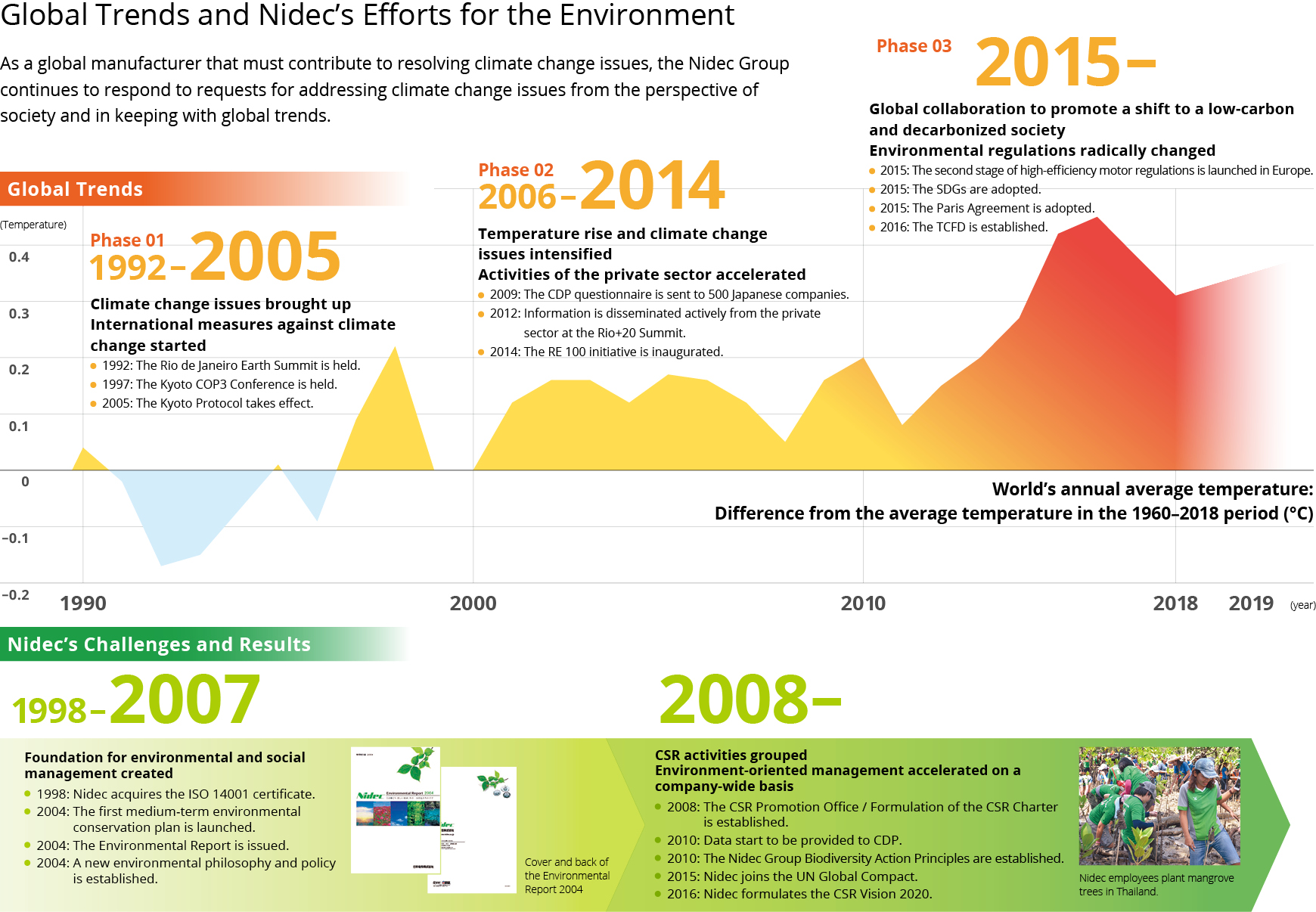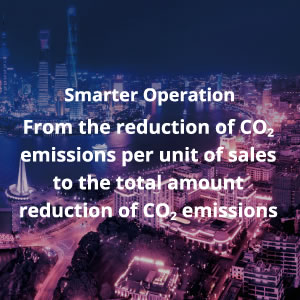Special Feature 2019 - Challenge to New Environmental Strategies
1. Global Trends and Nidec's Efforts for the Environment

The Nidec Group and Climate Change Issues
1998–2007: Climate change emerging as a social issue / Nidec’s environment-oriented management started
Worldwide discussion about climate change issues began at the United Nations Conference on Environment and Development held in Rio de Janeiro (Rio de Janeiro Earth Summit) in 1992. Under the United Nations Framework Convention on Climate Change, which was adopted at this Earth Summit, the Conference of the Parties (COP) has been held annually. Since the Kyoto Protocol was adopted at COP3 in 1997, there have been increasing social concerns about measures against environmental and climate changes.
In 1998, Nidec Corporation acquired the ISO 14001 certificate for the first time in response to social requests. In 2004, one year before the Kyoto Protocol came into force, we revised our environmental philosophy and formulated an environmental policy to enhance our environmental management system. The issuance of the Environmental Report, a predecessor of the current CSR Report, began in the same year.

2008–2018: Escalation of climate change issues and companies’ active launch of measures
Although various national governments began to take measures against climate change, no major improvements were made due to a confrontation between developed countries and emerging countries. During this time, however, the private sector, including companies and NPOs, launched actions independently.
In 2008, Nidec Corporation established an organization dedicated to CSR and formulated the CSR Charter to clarify its basic principles of CSR. At the same time, we began to create a system to collect data on environmental burdens covering all our group companies. In 2010, we began to use CDP, an information platform to analyze and disclose corporate data on environmental burdens and corporate efforts to cope with climate change. Since then, we have continued to disclose our climate change-related data.

2019: New challenges
Curbing climate change requires us to realize a future where we move away from fossil fuel-derived energy sources and cover almost all energy needed in the world with renewable energy-derived electricity. The Nidec Group contributes to spreading various electrical products and reducing global power consumption by providing energy-saving motors in all fields. We also contribute to spreading renewable energy through the provision of battery energy storage systems.
In addition, to reduce the amount of CO2 emitted through our group’s business activities, we launched a new project called SMART 2030 aimed at reducing the total CO2 emissions regardless of the size of a plant and a business facility. This strategically critical project aims to launch measures to effectively address climate change issues.

Time to Evolve a Climate Change Strategy
The level of people’s awareness of climate change issues increased after the Paris Agreement’s adoption in 2015. Climate change issues are now increasingly recognized as top-priority and urgent issues of the world.
The increase in the amount of CO2 in the atmosphere is a major cause of global warming, which causes serious climate change impacts. Companies with large CO2 emissions are required to engage in decarbonization efforts, aiming to achieve zero CO2 emissions.

The Nidec Group has implemented a three-year medium-term environmental conservation plan since 2004, aiming to reduce CO2 emissions per unit of sales by about 1% on a yearly basis. In this plan, even if the amount of CO2 emissions increased, the CO2 emissions would be evaluated as efficient if there is a larger increase in sales.
However, this evaluation method became unacceptable after the Paris Agreement was adopted in 2015.
The Nidec Group then launched a SMART 2030 Project, a new strategy to address climate change, in 2019. This project aims to reduce the total amount of CO2 emissions in FY2030 by 30% compared to FY 2017, without adopting the evaluation method based on the CO2 reduction per unit of sales. We at Nidec are committed to achieving a very challenging goal of significantly reducing CO2 emissions while increasing the company’s revenue and production.
For more details, please click here.

The sectorial breakdown of global CO2 emissions shows that the power generation sector accounts for the largest share of the emissions at 42%, followed by the transportation sector, at 24%*. Creating the decarbonized society envisioned in the Paris Agreement requires us to switch to CO2-free power generation and transportation methods. The Nidec Group offers breakthrough products that help people, for example, use solar power instead of thermal power, and ride electric vehicles (EVs) instead of gasoline-powered ones.
In the transportation sector, Nidec provides traction motors for EVs, which correspond to the internal combustion engines in gasoline vehicles. Our aim in this business is to lead others in the decarbonization of vehicles, and achieve the top share in the EV market.
In the power generation sector, Nidec provides battery energy storage systems (BESSs), which stabilize renewable energy supply, to help use the energies effectively.
* Source: International Energy Agency “CO2 Emissions from Fuel Combustion 2018”
Global CO2 emissions (from fuel combustion, 2016)

CO2 is emitted not only through business activities: A large amount of it is emitted from individual people’s daily activities as well. In Japan, such household-generated CO2 emissions are said to account for more than one-sixth of the nation’s total CO2 emissions.
Some suggest that preventing serious climate change requires a virtually complete elimination of carbon emissions by 2050. However tough this task may seem, it is something that each of the approximately 110,000 Nidec employees working in the world should face and try to overcome.
For more details, please click here.

